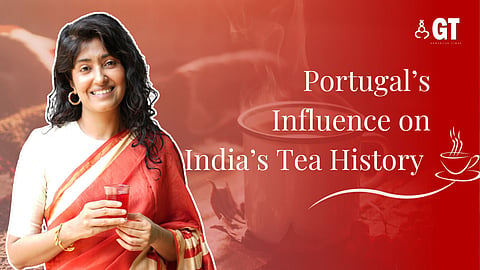

The next time you savour a cup of hot tea at your favourite cafe in Goa, spare a moment to acknowledge the role that the region’s colonial legacy played in order to make your cuppa happen.
According to Snigdha Manchanda, India’s first certified tea sommelier says it was a royal colonial matrimonial alliance between Great Britain and Portugal that had a big role to play in shaping the age of tea in British India as well as in Portuguese-held Goa.
Manchanda, who heads Tea Trunk, a premium tea outfit, in her talk ‘The Lusitanian Legacy: Portugal’s Influence on India’s Tea History and Goa’s Passion for Tea’ at MOG Sundays at the Museum of Goa in Pilerne, said that apart from the isles of Bombay, the dowry of Portugal’s Princess Catherine and Prince Charles II in the17th century also contained chests of tea.
“Her dowry included chests of tea, a gift that would significantly influence the people of England and lay the foundation for the cherished tradition of ‘afternoon teas’.
This newfound passion for tea soon journeyed across the seas to Portuguese colonies such as Goa, leaving a mark on Goa’s tea-drinking culture,” Manchanda said.
Portugal, she said, was one of the first European nations to secure a monopoly in tea trade with China.
“Portugal held the distinction of being the first European country to engage in trade with China, establishing the trading port of Macau in 1557. This monopoly granted Portugal control over the tea trade with China for over a century,” said Manchanda.
The rose flavoured tea, consumed in copious quantities in Goa, she says, is a unique tea consumption practice in India.
“Today, the people of Goa savour a distinctive tea called ‘rose tea’, a tea infused with the delicate aroma of roses. This unique Goan offering, rose tea, is believed to possess soothing properties that aid digestion,” Manchanda said and added, “Traditionally, rose tea is best when prepared with well water.”
The flourishing East India Company, she said, also spread the tea fervour in other parts of British-held India.
Tea, she said, was in many ways an upgrade to kadha, a hot concoction of boiled herbs or spices, which was a staple beverage in India, before tea became a rage.
“In India, our traditional morning ritual involved the consumption of kadha. As the story goes, the British then offered lower-grade tea to Indians and soon became a part of their kadha, which gave birth to tea, also known as ‘chai’ in India.
For example, they began incorporating tea into their kadha, with regional variations like introducing black pepper in Kerala, giving birth to masala tea,” she said.
Unlike coffee, tea, she said, offers a more relaxed experience, aligning with the laid-back susegad lifestyle of Goa.
“Tea varies distinctly from state to state, is prepared uniquely and has become an integral part of daily life,” she said.